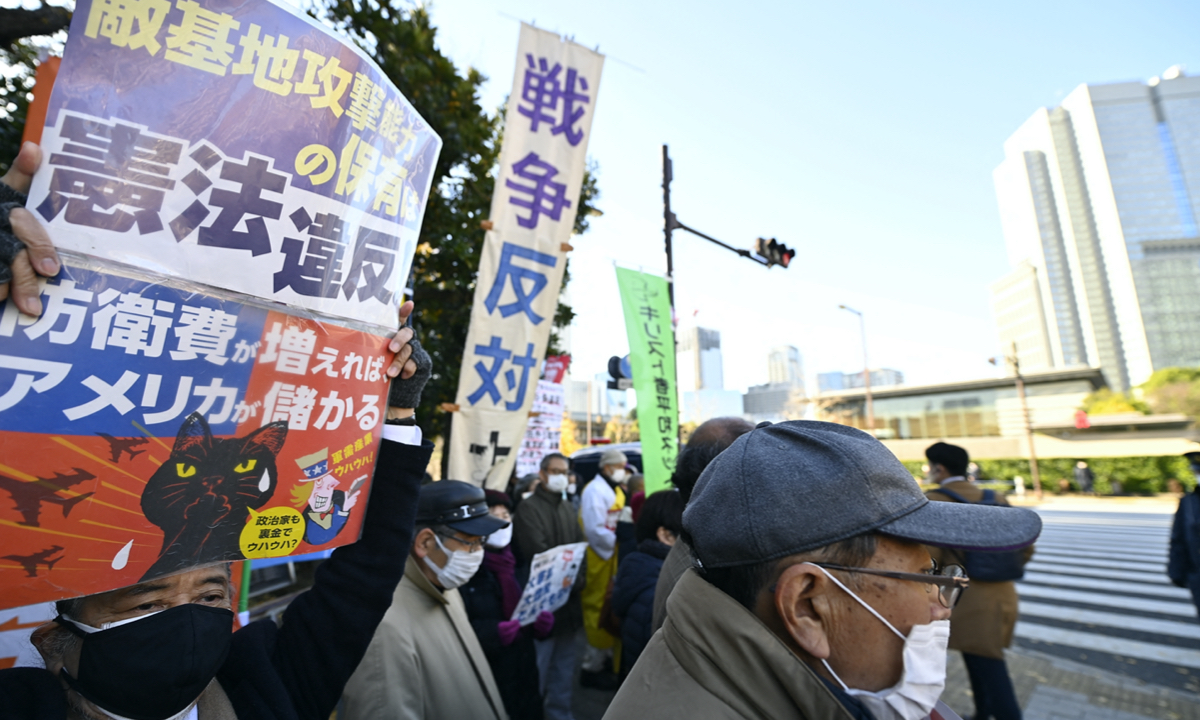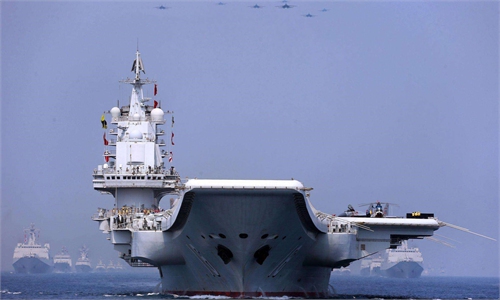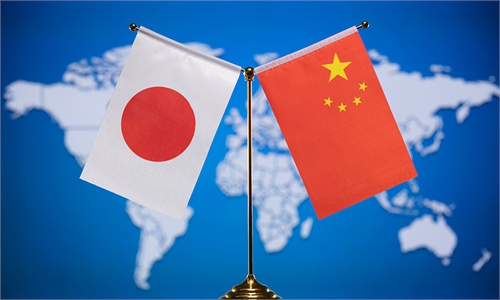
People gather outside Japanese Prime Minister Fumio Kishida’s office holding placards denouncing the violation of Article 9 of the Japanese Constitution in Tokyo on December 16, 2022. They also oppose the increase in the military spending budget. Japan approved its biggest military buildup since World War II on December 16. Photo: AFP
While Japan and the US have hailed the former’s new security strategy for "strengthening and modernizing the US-Japan alliance," neighboring nations have expressed growing worries about the instability that the new strategic change could bring to the region.
Analysts also warned that, rather than boosting its military build-up, the Japanese government should focus on resolving internal unrest as Prime Minister Fumio Kishida's administration faces its lowest approval rating.
After Japan on Friday approved three documents – the National Security Strategy (NSS), the National Defense Program Guidelines, and the Mid-Term Defense Program – in one of the country’s largest defense shake-ups since World War II, some US officials expressed welcome for Japan’s move.
US National Security Adviser Jake Sullivan on Friday said that Japan's goal to increase defense investments would "strengthen and modernize the US-Japan alliance," media reported.
However, support from the US did not help the Kishida cabinet save its approval rating, which has been on a downward spiral for months. According to a phone survey conducted over the weekend by the Mainichi Shimbun Daily, a quarter of Japanese approve of the government’s job performance, a drop of six percentage points from last month and a record low for Kishida's cabinet.
The public in Japan is dissatisfied with the Kishida over ties between several cabinet members and the controversial Unification Church. Furthermore, as Japan increases military spending, closing the deficit has become a controversial issue, as many citizens reject tax increases, Xiang Haoyu, a research fellow at the China Institute of International Studies, told the Global Times.
However, many people in Japan were in favor of the country having “counterstrike capabilities” – a phrase that has been written into the newly revised security policy as the Japanese government has ramped up efforts in hyping external threats, especially from Russia, China and North Korea after the start of the Ukraine-Russia conflict, analysts said.
Japan’s updated national security plan includes provisions that would allow the government to directly carry out counterattacks against enemy missile-firing facilities. This might theoretically allow Japan to launch direct attacks against North Korean or Chinese missile facilities. The government also intends to quadruple its military spending over the next five years, citing China and North Korea as threats.
Japan is seeking to break military restrictions in two ways: by increasing military spending and promoting military cooperation with other US allies as part of the US global strategy, Xiang pointed out.
The expert noted that Japan has now signed reciprocal access agreements with Australia and the UK, which have become de facto military alliances. It also promotes collaboration with NATO, the military alliance led by the US that has played an active role in pushing the US Indo-Pacific Strategy.
The US welcomes Japan’s increased military spending because it wants its ally to share more of its burden and help maintain its hegemony, while the US is preoccupied with competing with China and Russia and dealing with domestic crises, said Xiang.
This is also why the US has praised Japan's new security approach. "Japan has served as a shield, while the US has served as a spear. The shield can now be utilized to both protect and attack," Xiang explained.
However, in response to Japan’s military threats, other countries in the region may also beef up their militaries and a new arms race may emerge. With no country feeling secure any more, the region will fall into a security dilemma, Xiang said.
South Korea is expressing concerns over Japan's desire for "counterstrike capabilities" and its renewed claim over the Dokdo islets, called Takeshima by Japan. It also argued for closer consultation on defense issues and is worried that Japan’s new national security strategy could violate Japan's Constitution, often called the Peace Constitution due to the limits placed on the military, Korea JoongAng Daily reported on Sunday.
On Friday, a senior diplomat from the Japanese Embassy in South Korea was also summoned.
The spokesperson of the Chinese Embassy to Japan also released a statement on Friday to express opposition to Japan calling China its “unprecedented strategic challenge.” The spokesperson also noted that Japan had gone astray on militarism. Its current major shift on its security policy also raised questions on whether it is deviating from the peaceful path.


